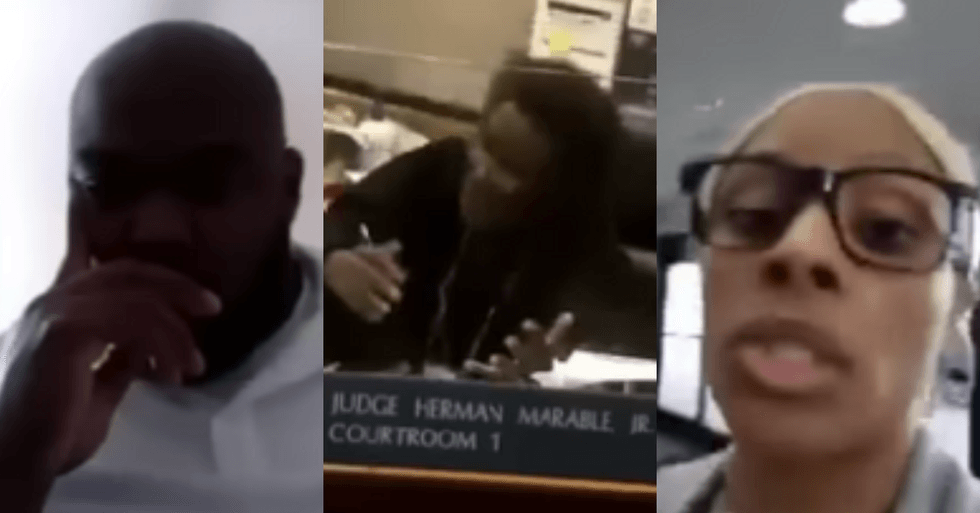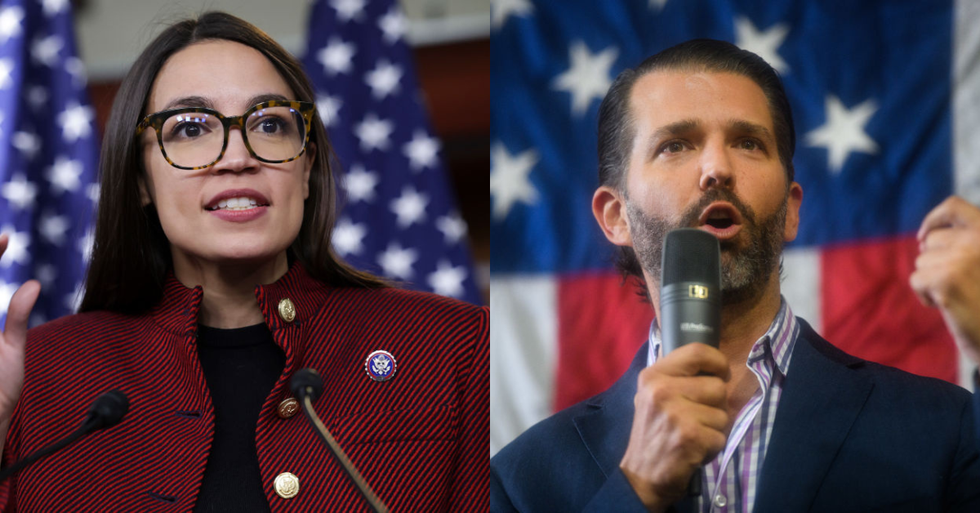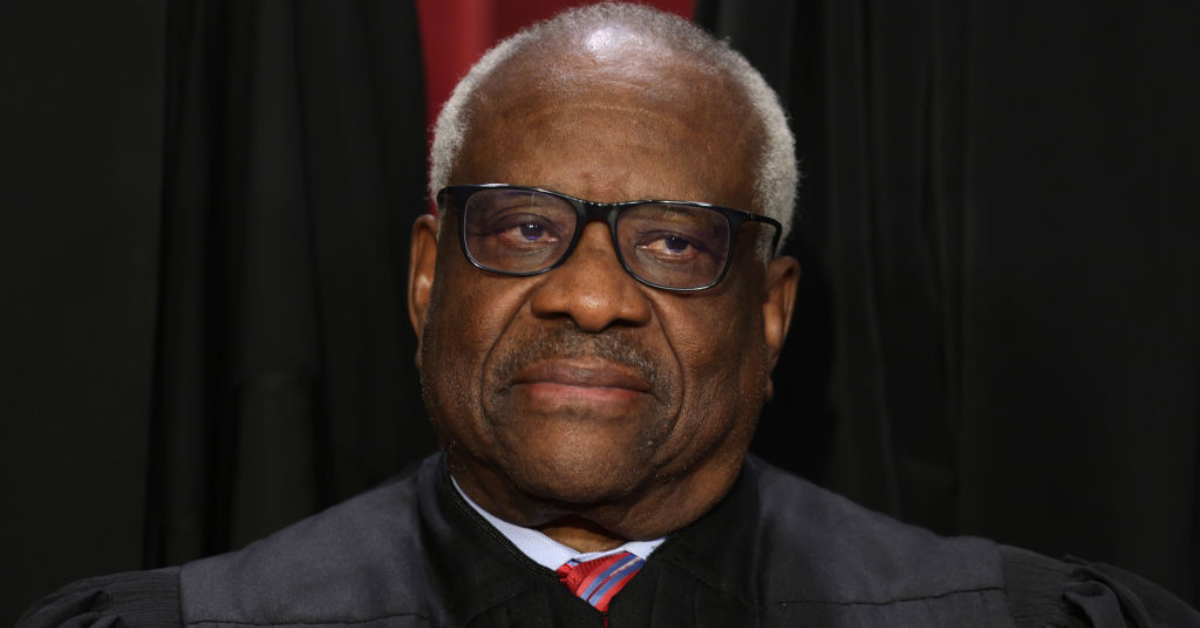Associate Supreme Court Justice Clarence Thomas raised eyebrows after he questioned the meaning of "diversity" during Supreme Court arguments regarding a challenge against the University of North Carolina Chapel Hill race-conscious admissions process.
Thomas—who is widely regarded as the Court's most conservative member—pressed North Carolina's solicitor general Ryan Park, who represented the university, for a more specific definition of the term.
You can hear what Thomas said in the video below.
\u201c\u201cI\u2019ve heard the word diversity quite a few times, and I don\u2019t have a clue what it means.\u201d\n\n\u2014 Justice Clarence Thomas asks for a \u201cspecific definition\u201d of diversity and its benefits during oral arguments for Students for Fair Admissions v. UNC, a case challenging affirmative action\u201d— The Recount (@The Recount) 1667231197
Thomas said:
"I've heard the word diversity quite a few times and I don't have a clue what it means. It seems to mean everything for everyone."
"I'd like you to give us a specific definition of diversity in the context of the University of North Carolina, and I'd also like you to give us a clear idea of exactly what the educational benefits of diversity at the University of North Carolina would be."
Park responded that the university's definition of diversity aligns with the Supreme Court's definition in prior cases, which is "a broadly diverse set of criteria that extends to all different backgrounds and perspectives, and not solely limited to race."
He said that the university values "diversity of all different kinds and all the ways that people differ in our society," adding that the "educational benefits" are obvious because diversity leads to a "deeper and richer learning environment," a "more creative thinking and exchange of ideas," and "reduced bias" on college campuses.
Thomas pushed back, saying that he "didn't go to racially diverse schools, but there were educational benefits," adding:
"I'd like you to tell me expressly when a parent sends a kid to college, they don't necessarily send them there to have fun or feel good or anything like that."
"They send them there to learn physics or chemistry or whatever they're studying."
Thomas later dismissed Park's reiteration of the university's views of the benefits of a racially diverse student body, saying that he doesn't "put much stock in that, because I’ve heard similar arguments for segregation.”
Thomas is only the second Black person to serve on the Court after the late Thurgood Marshall.
It is not likely he would have made it as far as he has without the aid of diversity and inclusion efforts—he went to Yale University under an affirmative action program for example—given the very long and sordid history of racial exclusion in the United States.
Many have criticized him as a result and suggested he is operating in bad faith.
\u201cSo we're supposed to believe this man is smart enough to be one of the top 9 legal minds in the country, but doesn't understand what "diversity" means?\n\nAs usual, always adopt the premise that conservatives are operating from a place of bad faith. You'll be right 95%> of the time\u201d— JJ (@JJ) 1667250895
\u201cJustice Clarence Thomas, who would never have gotten to where he is in life without diversity and inclusion, doesn't know what diversity is or why it's good.\n\n https://t.co/2Xr5htsIry\u201d— I Smoked The Kanyecosystem (@I Smoked The Kanyecosystem) 1667257491
\u201cGrimly funny that Clarence Thomas keeps asking "what are the EDUCATIONAL BENEFITS of diversity" and the pro-affirmative action lawyers keep providing detailed, specific answers, and every time he's just like "no those aren't educational benefits"\u201d— Jay Willis (@Jay Willis) 1667232262
\u201cSo many things to cringe at over this one sentence. \ud83d\ude35\u200d\ud83d\udcab\u201d— Democracy Activist, ABD (@Democracy Activist, ABD) 1667309986
\u201cWhich speaks volumes as to why he\u2019s unqualified to sit on the court.\u201d— Read Reid (@Read Reid) 1667256391
\u201cLone black man on the Supreme Court via affirmative action can't understand the point of affirmative action. \n\nhttps://t.co/P1ZHmSgGG0\u201d— Rachel Bitecofer \ud83d\udcc8\ud83d\udd2d\ud83c\uddfa\ud83c\uddf2\ud83c\uddfa\ud83c\udde6 (@Rachel Bitecofer \ud83d\udcc8\ud83d\udd2d\ud83c\uddfa\ud83c\uddf2\ud83c\uddfa\ud83c\udde6) 1667317416
\u201cJustice Clarence Thomas, who was admitted to Yale Law School when it had a robust affirmative action program, has argued that preferences stigmatize Black people. https://t.co/kA0qS0z96E\u201d— Newy Scruggs (@Newy Scruggs) 1667264545
\u201cJustice Clarence Thomas says he "has no clue" about what "diversity" means.\n\nAnd there's no reason why he should. He got nominated by Right-wing Republicans led by racist Senators Jesse Helms and Strom Thurmond. Blacks played no part in it.\u201d— Steffen White (@Steffen White) 1667290541
\u201cHard to know if he\u2019s feigning ignorance for the sake of an argument or if he\u2019s just that dense and in denial\u201d— Steven E Schend (@Steven E Schend) 1667302632
\u201cSCOTUS looked at an affirmative action case today and, Clarence Thomas said he doesn\u2019t \u201cknow what diversity is\u201d\u2026 Yeah, he thinks white conservatives like him for his glowing personality\u2026\u201d— Cyrus McQueen (@Cyrus McQueen) 1667252896
\u201cClarence Thomas "doesn't know what diversity is...". Well here's the deal, ..along the way, an American President in the interest of fairness, nominated you for the court. Do not think that it was because of your sterling credentials or because he didn't have more to choose from.\u201d— Wabashmom20 (@Wabashmom20) 1667245699
The case before the Court concerns racial discrimination in affirmative action programs in college admissions processes, specifically the University of North Carolina, which uses socioeconomic factors in administration and is claimed to incorporate race and violate Title VI of the Civil Rights Act of 1964.
The case seeks review of the Supreme Court decision Grutter v. Bollinger (2003) which validated the use of affirmative action programs in college admissions as long as race is not used as the sole deciding factor.
The case was originally certified and consolidated as part of Students for Fair Admissions v. President and Fellows of Harvard College, which involves Harvard University's undergraduate admissions process which is claimed to discriminate against Asian American applicants.
However, following the appointment of Associate Justice Ketanji Brown Jackson, who was a member of the Harvard board, the cases were split with Jackson abstaining from the Harvard case while participating in the North Carolina one.
 COMICSANDS
COMICSANDS percolately
percolately georgetakei
georgetakei secondnexus
secondnexus george's picks
george's picks












